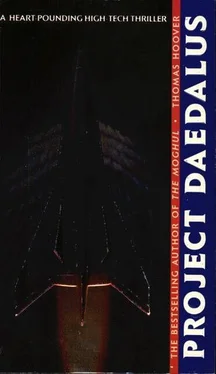Thomas Hoover - Project Daedalus
Здесь есть возможность читать онлайн «Thomas Hoover - Project Daedalus» весь текст электронной книги совершенно бесплатно (целиком полную версию без сокращений). В некоторых случаях можно слушать аудио, скачать через торрент в формате fb2 и присутствует краткое содержание. Жанр: Триллер, на английском языке. Описание произведения, (предисловие) а так же отзывы посетителей доступны на портале библиотеки ЛибКат.
- Название:Project Daedalus
- Автор:
- Жанр:
- Год:неизвестен
- ISBN:нет данных
- Рейтинг книги:5 / 5. Голосов: 1
-
Избранное:Добавить в избранное
- Отзывы:
-
Ваша оценка:
- 100
- 1
- 2
- 3
- 4
- 5
Project Daedalus: краткое содержание, описание и аннотация
Предлагаем к чтению аннотацию, описание, краткое содержание или предисловие (зависит от того, что написал сам автор книги «Project Daedalus»). Если вы не нашли необходимую информацию о книге — напишите в комментариях, мы постараемся отыскать её.
Project Daedalus — читать онлайн бесплатно полную книгу (весь текст) целиком
Ниже представлен текст книги, разбитый по страницам. Система сохранения места последней прочитанной страницы, позволяет с удобством читать онлайн бесплатно книгу «Project Daedalus», без необходимости каждый раз заново искать на чём Вы остановились. Поставьте закладку, и сможете в любой момент перейти на страницу, на которой закончили чтение.
Интервал:
Закладка:
That was when the president had nodded silently, then lifted a top-secret document from his black leather briefcase. He explained that it was a proposal from a consortium of foreigners. He wanted Andrei Androv's honest assessment.
"Read this, Andrei Petrovich," he said, passing it over, "and tell me what you think. It may well be a terrible thing even to consider, but I must know your view. You, my old friend, are one of the few men I know I can trust. This proposal, can it work?"
As he squinted by the flickering light of the fire, Andrei Petrovich Androv almost couldn't believe what he was reading. Among other things, the dream he had dreamed so long was there, his for the taking. The dream of a bold venture in space achieved with a whole new level of technology.
Along with it, the Soviet Union would receive everything it needed. The foreigners would provide billions and billions in long-term, low-interest loans and a flood of subsidized consumer goods to erase the pain of perestroika, providing the president with the badly needed financing, not to mention popular support, he needed to bring it off. But there were price tags, several of them. The first would be total access to all Soviet space and propulsion technology. That component would actually make sense technically, but the others were higher, much higher. Could it be done? Should it be done?
"What do you think, Andrei Petrovich?" the president had finally spoken, his voice a whisper above the snap of embers and the howl of wind. "Do we dare?"
The room had fallen silent for a long moment. Was this some kind of trap? he almost wondered, like the old days. No, he'd quickly concluded, this time Russia was different. He would have to trust Mikhail Sergeevich. Most of all, though, he was holding his life-long ambition in his hand. At last he replied, hope mingled with apprehension.
"I think we have no choice." He had looked up at the president's troubled eyes. "You have no choice."
"Unfortunately, I think you are right." He had sighed and turned his gaze to the blackness outside the snow- banked window. "Ve tyomnuyu noch, ya znayu. Yes, Andrei Petrovich. On this dark night, I finally know what we must do."
After one final vodka, they had set about devising the scenario that would change the world forever…
The airflow around the model continued to accelerate, while laser holograms of its complex aerodynamics were now being converted by the computer into multi-colored graphic art. Androv watched the wall-size liquid crystal display screen in the control room begin generating a vivid depiction of the streams whirling past the model, simulating the incremental stages of hypersonic climb. It was like watching a hallucination, he thought, as colors swirled around the fuselage of an object seemingly composed of 3-D lines and curves.
"We are now at Mach 6, Comrade Doktor Androv." The voice of a Soviet technician interrupted his thoughts. "The laser data show that the supersonic wave drag peaks at Mach 3.8, then subsides. Your new canard foreplanes appear to be working, at least for this portion of the flight envelope."
Androv studied the screen, noncommittal. "Thus far it would appear to be so. Perhaps the SX-10 was correct. All the same, at Mach 7, I want to switch on the enhancer, then capture those data and analyze them to be doubly sure."
The hypersonic enhancer permitted wind-tunnel burst tests at far higher velocities than a conventional facility could achieve. More high tech.
"There could still be a problem," Androv continued, "when the vortex of air currents shed from the nose of the fuselage encounters the shock waves from the wings, particularly around Mach 11." He turned to Ikeda. "Those vortexes have been responsible for significant damage to several American space shuttles during reentry phase. I need to see the data."
"As you wish." The director walked to the thick glass window that looked out onto the model suspended in the airstream. The crew of technicians hovered over the controls, watching for any signs of vibration. He studied the screens for a few moments, then spoke quietly to the head of the technical team, an intense young man in spectacles. This lieutenant turned and passed the order to his colleagues, who nodded gravely and stationed themselves at the switches.
Above the roar, a brilliant arc of electricity suddenly exploded just in front of the nose of the model, adding an additional burst of pressure at Mach 6 to the velocity already passing across. It was a blinding, microsecond pulse that momentarily boosted simulated vehicle velocity to Mach 13. The lasers registered the data, then passed it directly, via microwave link, into the memory banks of the powerful SX-10 operating hundreds of miles away.
Seconds later the turbulence data appeared in visual form on the liquid crystal screen above them. As the colored numbers flashed, a cheer went up from the normally somber technicians.
"Still no sign of any wave drag outside the theoretical envelope, not even at Mach 13," the young head-technician beamed.
"Just as we simulated," Ikeda noted quietly.
This time even the grave Androv smiled. "I must congratulate all of you." He was rising from his chair, the central one facing the main controls.
"Then I will order the modification installed," Ikeda nodded, "if you formally authorize it."
"Authorized. I think you are right. Perhaps we are ready for a hypersonic test flight." Androv reached to switch off his turntable. "I would like to go down to the hangar now myself, in fact. Perhaps celebrate this moment with a glass of tea."
"Of course." Ikeda spoke quickly to his Japanese technicians, then followed the Russian out the door.
The hallways were a connected maze of brilliantly lighted and scrupulously clean tunnels. They moved down the main corridor to the central checkpoint, then turned and entered the South Quadrant, passing the various assembly sections. Those sectors were mostly quiet now, since the final work had been completed several weeks earlier.
Androv said nothing as they walked toward the doorways connecting the South Quadrant with the underground hangar. He merely whistled a portion of the third movement of the A Minor quartet, Beethoven's hymn of thanksgiving in the Greek, Lydian mode. He recalled that the English writer Aldous Huxley had once suggested that particular movement was proof of God's existence.
Was there a God? He wasn't sure. The only miracles he knew of on this earth were performed by men. He was on the verge of performing one himself.
The history of space exploration had been played out entirely in his lifetime. He himself had been the architect of much of that progress. But putting a man into space remained an expensive and dangerous proposition. Launch vehicles still exploded with alarming regularity. Man was trapped on this planet. God was still in the heavens.
Man's hope of reaching God at will required a special creation, one that could taxi off a runway just like a normal aircraft, then accelerate to hypersonic speeds, reaching low-earth orbit. An air-breathing space vehicle. Its potential for the peaceful exploration of near-earth space defied imagination.
Peace. All his life, Andrei Petrovich Androv had worked in the shadow of war. Now, at last, he had created the ultimate symbol of peace.
The entry to the hangar was secured, but when the guards saw Dr. Androv and the project director approaching, they saluted and punched in the codes on the locks. Moments later the heavy steel doors slid aside, revealing the brilliant lights of the hangar. It was cavernous, over a hundred feet high, with gantries now standing idle along the walls. White-coated technicians swarmed over the two prototypes, checking the final seals, while others were on twenty-foot-high trucks servicing the engines.
Читать дальшеИнтервал:
Закладка:
Похожие книги на «Project Daedalus»
Представляем Вашему вниманию похожие книги на «Project Daedalus» списком для выбора. Мы отобрали схожую по названию и смыслу литературу в надежде предоставить читателям больше вариантов отыскать новые, интересные, ещё непрочитанные произведения.
Обсуждение, отзывы о книге «Project Daedalus» и просто собственные мнения читателей. Оставьте ваши комментарии, напишите, что Вы думаете о произведении, его смысле или главных героях. Укажите что конкретно понравилось, а что нет, и почему Вы так считаете.












